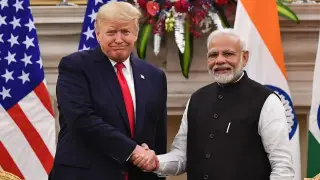
ANI
New Delhi: The resurgence of farmer protests worldwide poses a significant challenge for incumbent governments while offering a strategic opportunity for opposition factions. From India to Europe, agricultural communities are mobilizing, demanding better pay, protection from foreign competition and policy reforms to address their grievances. These protests, often timed before major elections, underscore the formidable power of farmer unions and their ability to influence political landscapes.
In New Delhi, echoes of the 2020-2021 farmer protests reverberate as farmers rally once again under the banner of 'Delhi Chalo'. Their demands remain consistent: a legal guarantee for Minimum Support Price (MSP) across all crops, debt waivers, pension schemes and the implementation of the Swaminathan Commission’s recommendations. Additionally, they seek the withdrawal of cases filed against protesters during the previous demonstrations.
Aerial view of India’s farmer protest at Shambu border where farmers are clashing with police from last 3 days while trying to march towards Delhi. pic.twitter.com/oF1fO3vw1P
— Praveen (@praveenpscs) February 15, 2024
The phenomenon of farmer protests transcends borders, manifesting in various forms across Europe and beyond. In France, for instance, tractor blockades near Paris on January 29 highlighted farmers' demands for greater government concessions and protection from international competition. President Emmanuel Macron's administration has attempted to appease farmers, yet discontent persists.
Huge farmers protest convoy in Toulouse, France. 🇫🇷 🚜
— James Melville 🚜 (@JamesMelville) January 19, 2024
The blue-collar rising is happening all over Europe. Workers have had enough of being treated like dirt by their own governments. Enough is enough. #NoFarmsNoFood
pic.twitter.com/agfjqQISqO
Similarly, German farmers have staged nationwide protests against subsidy cuts and the removal of tax breaks on agricultural diesel, fearing financial repercussions. In Spain, recent demonstrations paralyzed highways in Madrid, underscoring farmers' concerns over EU environmental regulations and the transition towards organic farming.
Thousands of people have now joined the German farmers in the largest protest against the World Economic Forum governance and the liberal policies that are failing the people of Germany.
— Donald J. Trump 🇺🇸 News (@DonaldTNews) January 8, 2024
HEROS.
🔊 pic.twitter.com/cj48LwVm0k
The agricultural landscape in Spain is also witnessing a pivotal moment as agriculturists rally against economic challenges. Echoing protests in France and Germany, Spanish farmers have converged in Barcelona to demand reforms and highlight the pressing issues plaguing the industry. The backbone of Spain's economy, its agricultural sector, faces mounting challenges. The soaring production costs and stiff competition from non-EU nations have pushed Spanish agriculturists to the brink.
WOAH
— PeterSweden (@PeterSweden7) February 11, 2024
The massive farmers protest in Spain is continuing. Thousands of tractors out protesting against Socialism and the Agenda 2030.
SHARE - You won't see this video on the news 👇pic.twitter.com/kSRNz5kceG
Europe grapples with the dual challenge of meeting EU environmental mandates while addressing domestic political interests. The Green Deal, aimed at achieving zero pollution by 2050, introduces measures that could disrupt traditional farming practices. Politicians navigate a delicate balance between EU directives and local demands, striving to maintain electoral support amid rising farmer unrest.
The intensification of farmer protests amplifies political disquiet and uncertainty, mirroring the situation in India. Ahead of major elections, governments confront the daunting task of quelling discontent within a crucial voter demographic. Recent elections in New Zealand and the Netherlands illustrate the pivotal role of farmer agitations in shaping electoral outcomes, with parties aligning themselves with farmers' interests experiencing electoral success.
As farmer unions assert their influence on governments through mass mobilization, the global political landscape undergoes profound shifts. The convergence of farmer protests across continents underscores the potency of grassroots movements in shaping policy agendas and electoral outcomes. Governments face mounting pressure to address the grievances of agricultural communities, lest they risk electoral repercussions in an increasingly mobilized electorate.













Copyright © 2025 Top Indian News
